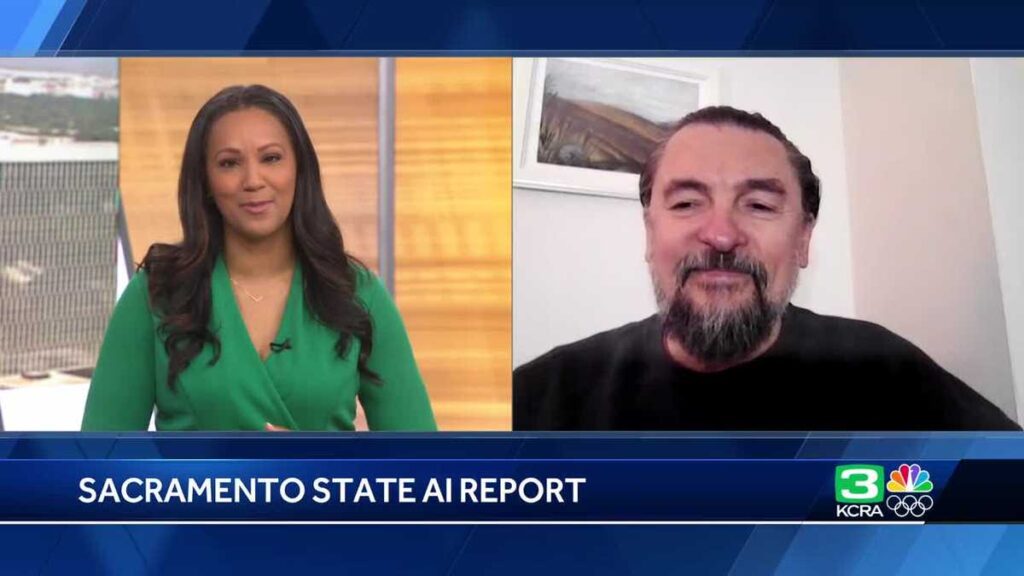A new Sacramento State report shows why college professors are worried about AI.
AI and the complexity of higher education. The report, titled, I am literally overwhelmed by this attack. Faculty, AI practices and attitudes, were issued in the SAC state. And this morning we welcome SAC State's Chief AI Officer, Sasha Sidorkin. Sasha, good morning. Thanks so much for being here. how are you in the morning I'm doing fine. We have some information that we want to show our viewers while we're talking about this a little bit, explain some of the key findings of the report. Uh, well, very bad news, technology is very, very disruptive. Oh, you know, students start using it for their homework and if you're not putting in some kind of effort, you're not learning anything. So that's the most annoying thing. And the faculty actually needs to revise their curriculum, which requires a lot of time and effort. And the good news is that perhaps a third of faculty use it frequently or occasionally. And they also encourage students to use AI. So we have both good and bad news in the report. The report also identifies some areas that need immediate attention. What are they? Oh, well, first we need to put good quality AI tools in the hands of faculty. Oh, it's important that if you don't use it as a faculty member, you don't encourage students to play with it. It's as simple as that. Oh, and the other is that there are some uses of AI that we should really promote and encourage. For example, you students may use it as personal tutors. If they don't understand the problem. Ask the AI and it will give you feedback and give you as much explanation and examples as you want. So this kind of usage is a very legitimate and actually very useful one. Can you specifically talk briefly about the ways in which SAC State specifically addresses AI in classrooms? Yes. So we have, UH, innovative faculty and they invent, UH, assignments that actually require students to use AI. You refer to your cues and you turn into results, and then you talk about it. You discuss what AI can do well and what it can't do well. And we are human. come in So we have very few people, few people who actually experiment with it. And they are very successful. At UH, we also try to conduct workshops and training for faculty and staff to show them how to use AI in their daily work and in the classroom as well. What do you hope will happen as a result of this report and this survey? Well, I want to address this, uh, sort. It's a lot of work. Uh, our industry, higher education, has been hit harder than any other industry because it's immediate. And every day students bring it with them to the classroom. So we need help and need help. And I want to, uh, bring the attention of the faculty. No one is going to do that for us. There is no general solution. This discipline is specific to each discipline. This is a different use of AI. So I just want more people to think about it and try to work on finding creative and innovative solutions. Was there anything that surprised you about the data when it came back? I knew it was tough on the faculty. I just didn't, uh, know how stressful it is. I mean, it's really serious, you know, students turn into work, you see it can't be, oh, it can be created with the help of somebody or something. And you don't have any proof that AI doesn't actually have a reliable identity. use And it's better to confront the issue and bring AI into the open debate than to ignore it. And I think that's the extent of the trouble on the faculty. I think that was a little surprising to me. Absolutely. Very, very interesting. Well, Sasha, we appreciate you talking to us. And we know you are SAC status, UH, I CZAR. And so I know there's a lot of work going on right now to try to confront that. Dwarf
A new Sacramento State report shows why college professors are worried about AI.
A new report explores the complexities of artificial intelligence in higher education. The report, titled “I'm Literally Overwhelmed by the Attack: Faculty AI Practices and Attitudes,” was recently released by the National Institute on Artificial Intelligence in Society at Sacramento State. Read the report here. According to a news release on the report, “The key findings highlight the lack of consensus on fair use of AI and the need for a critical approach to policy development. The report calls for a strategic, collaborative, and urgent The need is emphasized. A research-informed approach to the integration of AI in higher education. Download our app here.
A new report explores the complexity of artificial intelligence in higher education.
The report, titled “I'm Literally Overwhelmed by the Attack: Faculty AI Behaviors and Attitudes,” was recently released by the National Institute on Artificial Intelligence in Society at Sacramento State.
Read the report here.
According to a news release on the report, “Key findings highlight the lack of consensus on fair AI use and the need for a critical approach to policy development. The report calls for a strategic, collaborative, and research-informed approach.” The approach emphasizes the urgency of addressing the multifaceted challenges associated with AI integration in higher education.”
Sacramento State's Chief AI Officer, Dr. Sasha Sidorkin, joined KCRA 3 this morning.
Click on the video above to watch the full interview.
See more coverage of California's top stories here | Download our app..
